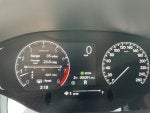What is the most likely "degree of freedom" to explain surprisingly poor fuel economy in a brand new car, versus "what everybody else gets", or "compared with every other car I've driven before"? The driver.
There is most likely some kind of driver behavior or use pattern thing at work, because these are combustion engines. Saying "there's something wrong with the car for me to get this kind of fuel economy!" (especially a brand new one) should be both highly unlikely, and relatively obvious.
And that is NOT throwing shade, like me saying "learn to drive, numbnuts!". Every car model is configured and tuned differently. What was the "sweet spot" for performance/economy in one car can be very different for another, even from previous generations of the same model, even if you have a 2.0 NA 11th Gen and used to drive an earlier gen NA Civic.
I recently purchased a 2022 Honda Civic normally aspirated 2.0 ltr hatchback w/manual tranny and am experiencing very similar mileage numbers. I was caught by surprise at those values as well, and with one oil/filter change at 1100 miles and one planned at approximately 2200 miles, I'll keep an eye on any change in mileage numbers either way. I do expect as the engine accumulates miles, mileage numbers should climb at least with steady highway driving. I'll update this thread as the miles accumulate.
"Breaking in" a new car has almost nothing to do with fuel economy, it has to do with long-term engine reliability in terms of piston seating and whatnot.
These are combustion engines, so there are only three ingredients in making the car go: fuel, air, and spark. If you haven't noticed the car "going" badly - sputtering, stuttering, lagging, engine revving super high for no obvious reason, etc., - then it's unlikely one of those three things are mechanically wrong.
Specifically, if the fuel injectors were pumping more fuel than needed into the engine - running "rich" - you would notice a smell of fuel, rough or high engine idle, and weird engine response. (I know this from personal experience.)
My advice: refill your tank, reset the MPG reading, and spend at least half an hour driving around consciously focusing on
coasting as much as possible. Foot completely off the gas unless you are accelerating, and "pulse" when doing so (take your foot off the gas as soon as you reach the speed you intended).
My guess is you're still lightly pressing on the gas pedal to maintain constant speed, as if you were going uphill, when you don't have to be doing it in this car. Other cars I've driven would quickly slow down with the foot off the gas and needed constant light throttle just to maintain speed, not this one.
Or maybe you have a fuel line leak. Hope you don't smoke!





